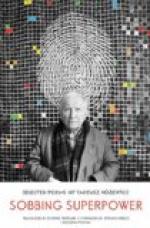|
This section contains 1,373 words (approx. 5 pages at 300 words per page) |

|
SOURCE: A review of Forms in Relief and Other Works and Bas-Relief and Other Poems, in Slavic and East European Journal, Vol. 39, No. 4, Winter, 1995, pp. 647–48.
In the following review, Meyer compares two different translations of Różewicz's Płaskorzeźba.
Tadeusz Różewicz (1921–), one of the greatest living Polish writers, has worked in various literary genres, including lyric, drama, prose, and criticism. He began publishing poems and stories under a pseudonym in the underground press during the Nazi occupation while serving as a partisan in the antifascist Homeland Army (Armija krajowa). Almost immediately after the publication of his first book, Niepokój (Disquietude, 1947), he was recognized as a major voice of postwar Poland, and quickly became a classic poet in his own lifetime.
Both Sokoloski and Czerwinski concentrate on Różewicz's most recent work, especially his 1991 book, Płaskorzeźba, the title of which, translated freely as Forms...
|
This section contains 1,373 words (approx. 5 pages at 300 words per page) |

|


